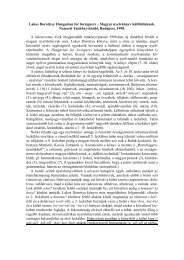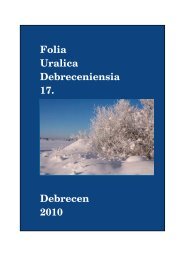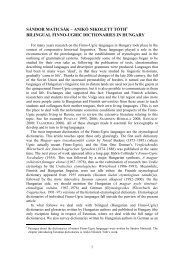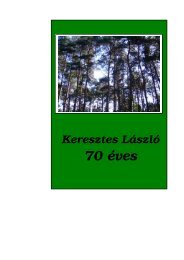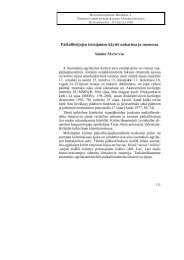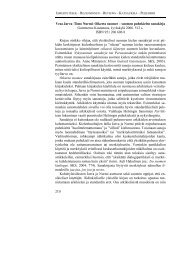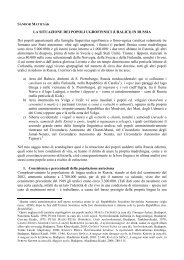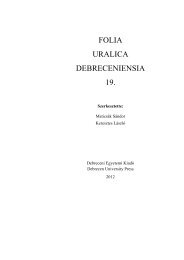Allomorphic variants of Erzya-Mordvin nominal derivational suffixes
Allomorphic variants of Erzya-Mordvin nominal derivational suffixes
Allomorphic variants of Erzya-Mordvin nominal derivational suffixes
Create successful ePaper yourself
Turn your PDF publications into a flip-book with our unique Google optimized e-Paper software.
kortamka ’conversation, dialogue’ ← korta- ’to talk’, nalkśemka ’toy’ ← nalkśe- ’to play’, nardamka’towel’ ← narda- ’to wipe’, nuŕťamka ’funnel’ ← nuŕťa- ’to pour’, ozamka ’seat, chair’← oza- ’to sit’, pejďemka ’joke, prank’ ← pejďe- ’to laugh’.3.5.2. The -lma, -lmo <strong>nominal</strong> suffix can only be found in few words (Cygankin 1981: 42; 2000c:147; EK 37; Grammatika 1980: 106; Mészáros 1998: 102).c) It can be stated based on the few examples available that the suffix is attached to stems (passiveroots) ending in a vowel without any difficulties: kuvalmo ’length’ ← kuva-ka ’long’, stalmo’weight’ ← sta-ka ’heavy’; čuďelma ’bed, channel’ ← čuďe- ’to flow, to stream’, tustolma’concentrate’ ← tusto ’thick; rich’. I found only one example for the -CC stem-ending, and inthis case, the suffix was attached with the addition <strong>of</strong> a connective vowel: pokšolma ’size,extent’ ← pokš ’big’. For this reason, Mészáros suggests the -lma, -olma, -lmo forms for thesuffix.f) The -lma, -olma variant is added to stems containing -o/-e sounds, the -lmo allomorph is usedafter stems containing the -a sound, similarly to the -mo, -ma suffix (cf. 3.4.1.)3.6. -CVC type <strong>suffixes</strong>3.6.1. The -kaj is infrequent both as a de<strong>nominal</strong> <strong>nominal</strong> suffix and as a deverbal adjectivalsuffix. It is not productive anymore (Cygankin 1981: 47–48; 2000c: 150–151; EK 37; Grammatika1980: 108).a) Based on the few examples available, it can be said that the stem-final vowel <strong>of</strong> the nouns isdeleted: jakśťeŕkaj ’beetroot’ ← jakśťeŕe ’red, purple’, paťkaj ’older sister-in-law (the sister <strong>of</strong>one’s husband)’ ← paťa ’elder sister’, siŕkaj ’aunt (the elder sister <strong>of</strong> one’s mother)’ ← siŕe’old’. Verbal stems behave in the same way: keńgeľkaj ’lying’ ← keńgeľe- ’to lie’, koľńagaj’naughty, mischievous’ ← koľńe- ’to be naughty; to whine’.c) The suffix is directly attached to stems ending in a consonant: ’snowdrop’ ← ?seń ’blue’,matkaj ’mother-in-law (the wife’s mother)’ ← mať ’mother’. – It is possible that the samesuffix is susceptible in several plant and animal names the root <strong>of</strong> which is now a non-existentword: ćipiŕkaj ’amaranth’; kaľďeŕkaj ’catchfly’, kukońkaj ’Solomon’s seal’, lakštorkaj’bluebell’, nunolkaj ’(a type <strong>of</strong>) hawthorn’, varmańkaj ’primrose’, and also čemeńkaj ’cockpigeon’,noronkaj ’lark’, piťeŕkaj ’lapwing’, torkaj ’lark’ (without a firm etymologicalbackground, the only certain information about the linking rules <strong>of</strong> these words is that they areusually attached to stems ending in a consonant).e) There is also a -gaj variant <strong>of</strong> this suffix: ćiligaj ’lapwing’, tingaj ’bullfinch’, seńkaj ~ seńgaj’snowdrop’, peďagaj ’thistle’, moragaj ’a person fond <strong>of</strong> singing’ – this variant appears onlysporadically, in dialectal forms.3.6.2. The -gan suffix is a very rare deverbal suffix (Cygankin 1979: 158; 1981: 50; 2000c: 152;EK 37; Grammatika 1980: 108). Based on the little data we have, the following can be supposedabout it:a) The stem-final vowel may be deleted before it: ťuŕgan ’militant’ ← ťuŕe- ’to fight’ (but:mančigan ’cheat, fraud’ ← manče- ’to deceive, to cheat’).b) The last syllable <strong>of</strong> the stem may be deleted: avaŕgan ’weepy’ ← avaŕďe- ’to cry, to weep’.c) No connective vowel is added before the suffix.3.7. A -VC type suffix3.7.1. Cygankin (1979: 157–158; 1981: 49; 1999: 9–10; 2000c: 151–152) detects an -aŕ suffix insome words (this suffix is probably Russian origin, cf. библиотекарь ’librarian’, секретарь’secretary’, пономарь ’sacristan’).11



